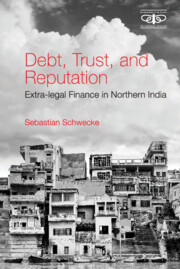6 - Obligation
Published online by Cambridge University Press: 30 November 2021
Summary
A sahib has got to act like a sahib…. To come all that way, rifle in hand, with two thousand people marching at my heels, and then to trail feebly away, having done nothing – no, that was impossible. The crowd would laugh at me. And my whole life, every white man's life in the East, was one long struggle not to be laughed at.
As discussed extensively in the previous chapters, extra-legal financial markets need to adjust to the heightened levels of uncertainty inherent not only in the credit contract as such but especially in credit contracts that cannot rely on strong mechanisms of enforcing obligations. The guarantee of contractual law for the regulated segment of credit markets by the modern Indian nation-state constituted one of the strongest possible mechanisms, especially from the creditor's point of view, and particularly in favour of the creditor. At the same time, financial markets in India (and beyond) had long experience with producing conditions that facilitated enforceability at need – the various structures of social embeddedness that lay at the heart of the bazaar economy in its South Asian variant. Historically, financial markets in Banaras had been designed to operate in the absence of strong state enforcement of obligation: as a commercial and financial centre that for long periods had been at the margins of imperial structures of authority, and had flourished despite the lack of politico-military control – or possibly precisely because of it – the credit markets of Banaras were well steeped in modes of governance that created possibilities for sanctioning misbehaviour across caste and community membership. Many of these rested on the versatility of reputational flows governing the hundi trade. But linked to this trade, the reputation of the local market – a crucial content of information for any trader sufficiently distant or otherwise detached from local conditions to be unable to have reputational knowledge of individual bankers or banking families – rested on the enforcement of obligations by the local bankers and merchants. In the absence of arbitrators specifically employed for these purposes like the amin in Geertz's depiction of the bazaar in Morocco (Geertz 1979), it rested on the city's ‘indigenous’ banking families.
- Type
- Chapter
- Information
- Debt, Trust, and ReputationExtra-legal Finance in Northern India, pp. 201 - 227Publisher: Cambridge University PressPrint publication year: 2022

